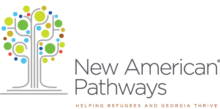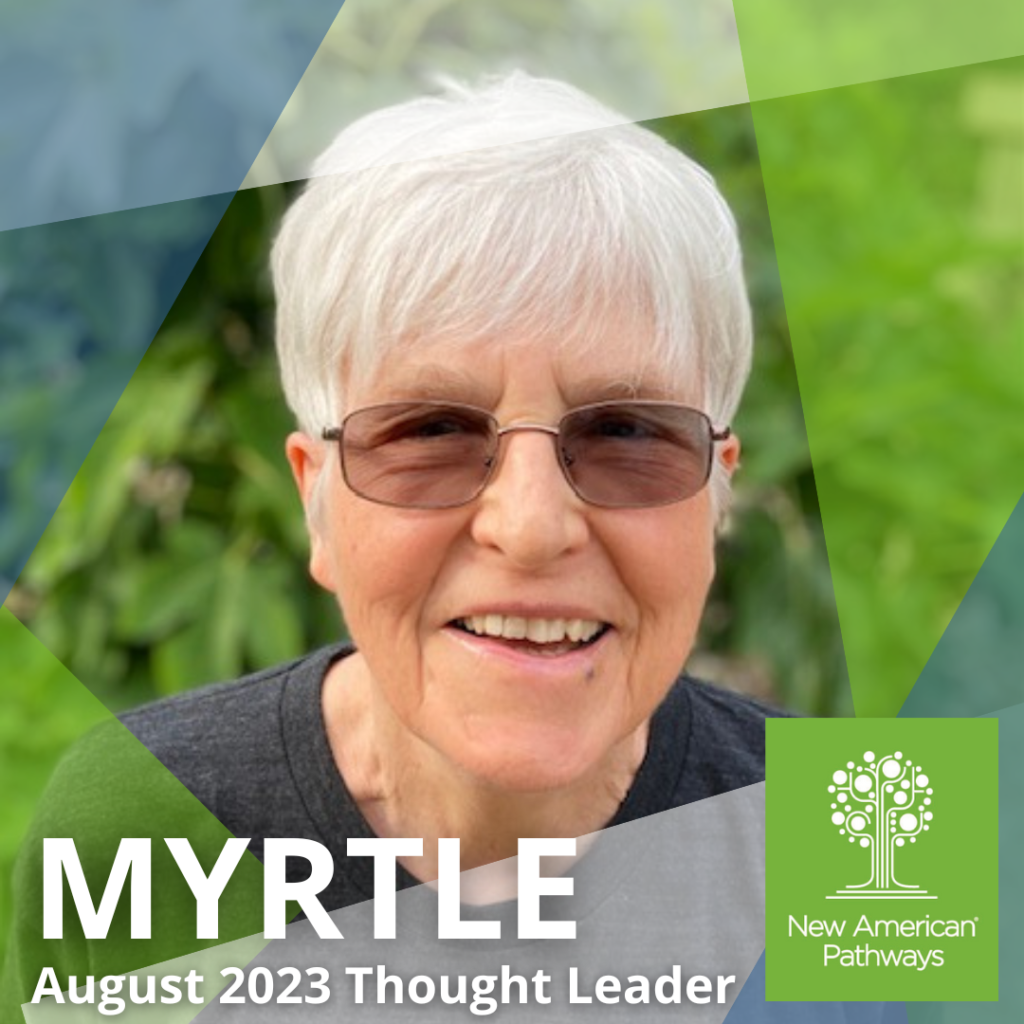One of the biggest barriers for newly arriving refugees and immigrants is language. Speaking English is a key factor in building a pathway to success in their new homes. Without proficiency in English, refugees and immigrants struggle to attend school and obtain work. Our English At Home (EAH) program serves refugees who are unable to attend traditional English as Second Languages (ESL) classes by matching them with volunteers who can tutor them in their homes or virtually. Volunteers are provided a curriculum for reference and work closely with our team to monitor progress.
We spoke with Myrtle Lewin who has been a volunteer with our English At Home program for more than seven years. She has worked with countless refugees and immigrants to help improve their language skills. We discussed why she wanted to get involved with New AP and how volunteering has impacted her.
How long have you been volunteering with New AP?
I started tutoring at New AP in late 2016 – more than six years ago, with a Syrian refugee student at home with her kids, and have tutored through New AP ever since.
Why did you want to volunteer with us? And why did you want to be involved with the English At Home program specifically?
I had tutored ESL years earlier (to immigrants from the FSU), and wanted to do so again after retiring. The EAH program promised to give me an opportunity to get to know someone from a culture different from my own and to develop a friendship. And it did just that. I worked with both a Syrian woman and a Nepali woman, and indirectly worked with their entire families. Both are now U.S. citizens. I’ve been working with a woman from the Congo for the past two years.
What’s the best part about being a volunteer with the EAH Program?
The EAH program let me choose a schedule that fit well with my other commitments. I was able to develop a sensitivity to my students’ needs and to appreciate their strengths. By watching their progress and adjusting my expectations to their learning styles, I have improved my own skills.
What skills do you need to volunteer with EAH?
You need patience, compassion, and the willingness to adjust your expectations. Tutoring someone whose native language uses a different alphabet (or who may be illiterate in their native language) adds a layer of complexity to the tutoring. Working face to face is way easier than working on Zoom, of course. Both face to face and online, you need materials – texts, online resources, paper and pens, and often you will use kitchenware, clothing, etc. as teaching tools. New AP offers some materials and mentoring support which is very helpful. I’ve found that picture dictionaries are great and help students who might need visual aids! New AP will give this to you and to your student if needed.
You also need to insist (gently) on discipline. The student needs to commit to the meeting times you decide on and needs to do some homework. Even if that is only to practice, practice, practice what you did together! You need to find a good place to work–a table and chairs, with good lighting if this is face to face and reliable internet if it’s virtual.
What advice would you give to someone who is considering volunteering with EAH?
Don’t think that because you’ve never taught ESL before, you can’t do this! Whatever your life or work experience, you’re a teacher. Just put yourself in their place and try to understand where they’re coming from. And use the New AP support staff to help you when you need it.
Is there any other advice you’d give to a first-time EAH volunteer?
You need to plan your lesson each time you meet. But don’t over-plan. You need to be flexible because often what you think will work doesn’t. You need to use very simple language, speak slowly, pronounce clearly, and write legibly. Your student needs a folder or binder to keep track of their work. Being organized is important!
In time, you’ll get to know your student’s family, but be careful not to ask too many questions especially right at the beginning. Your student needs privacy, as do you. In time, they might open up to you. But always remember that their life has probably been tumultuous, and they might not want to dwell on unhappy memories while trying to learn an entirely new language. And most of all, have fun! This is hard work but it’s also incredibly rewarding to see the student’s progress.

